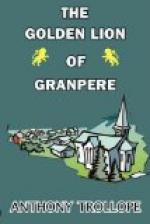The day went by, and the supper was eaten, and the cigars were smoked, and then they all went to bed. But nothing more had been settled. That obstinate young man, M. Adrian Urmand, though he had talked of his lawyer, had said not a word of going back to Basle.
CHAPTER XX.
It is probable that all those concerned in the matter who slept at the Lion d’Or that night, made up their minds that on the following day the powers of the establishment must come to some decision. It was not right that a young woman should have to live in the house with two favoured lovers; nor, as regarded the young men, was it right that they should be allowed to go on glaring at each other. Both Michel and Madame Voss feared that they would do more than glare, seeing that they were so like two dogs with one bone between them, who, in such an emergency, will generally fight. Urmand himself was quite alive to the necessity of putting an end to his present exceptionally disagreeable position. He was very angry; very angry naturally with Marie, who had, he thought, treated him villainously. Why had she made that little soft, languid promise to him when he was last at Granpere, if she had not then loved him? And of course he was angry with George Voss. What unsuccessful lover fails of being angry with his happy rival? And then George had behaved with outrageous impropriety. Urmand was beginning now to have a clear insight of the circumstances. George and Marie had been lovers, and then George, having been sent away, had forgotten his love for a year or more. But when the girl had been accommodated with another lover, then he thrust himself forward and disturbed everybody’s arrangements! No conduct could have been worse than this. But, nevertheless, Urmand’s anger was the hottest against Michel Voss himself. Had he been left alone at Basle, had he been allowed to receive Marie’s letter, and act upon it in accordance with his own judgment, he would never have made himself ridiculous by appearing at Granpere as a discomfited lover. But the innkeeper had come and dragged him away from home, had misrepresented everything, had carried him




